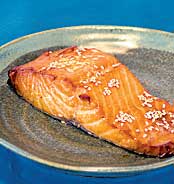 Â Researchers at Hopital La Colombiere in Montpellier, France tell us, “The observed health benefits of fish consumption in the elderly could be related not only to the increase in omega-3 fatty acid intake but also to other nutrients such as selenium.”
 Researchers at Hopital La Colombiere in Montpellier, France tell us, “The observed health benefits of fish consumption in the elderly could be related not only to the increase in omega-3 fatty acid intake but also to other nutrients such as selenium.”
First, the details.
- 200 elderly people with information on red blood cell (RBC) fatty acids concentrations, and selenium blood levels, completed food frequency questionnaires.
- Correlations were made with the number of fish meals per week .
And, the results.
- Selenium blood levels were negatively correlated with RBC omega-6 levels and positively with omega-3 levels.
- Selenium blood levels, RBC levels of omega-3, docosahexaenoic acid (DHA), and eicosapentaenoic acid (EPA) increased with fish consumption.
- Conversely, levels of omega-6 fatty acids were lower in those with the highest fish consumption.
- All associations between selenium blood levels and fish consumption remained significant when adjusting for omega-6 alone or combined with age, sex, education, diabetes, high blood pressure, abnormal cholesterol levels, cardiovascular diseases, and broad food categories (meat, eggs, dairy products, cereals, fruit, and vegetable).
- Associations between omega-3 fatty acids and fish also remained significant in the same model independently of selenium.
The bottom line?
This doesn’t change the benefits of eating fatty fish.
However, future researchers will have to consider selenium as a potential confounding or competing factor in the interpretation of the effects of omega-3 when eating fatty fish.
1/20/09 19:57 JR